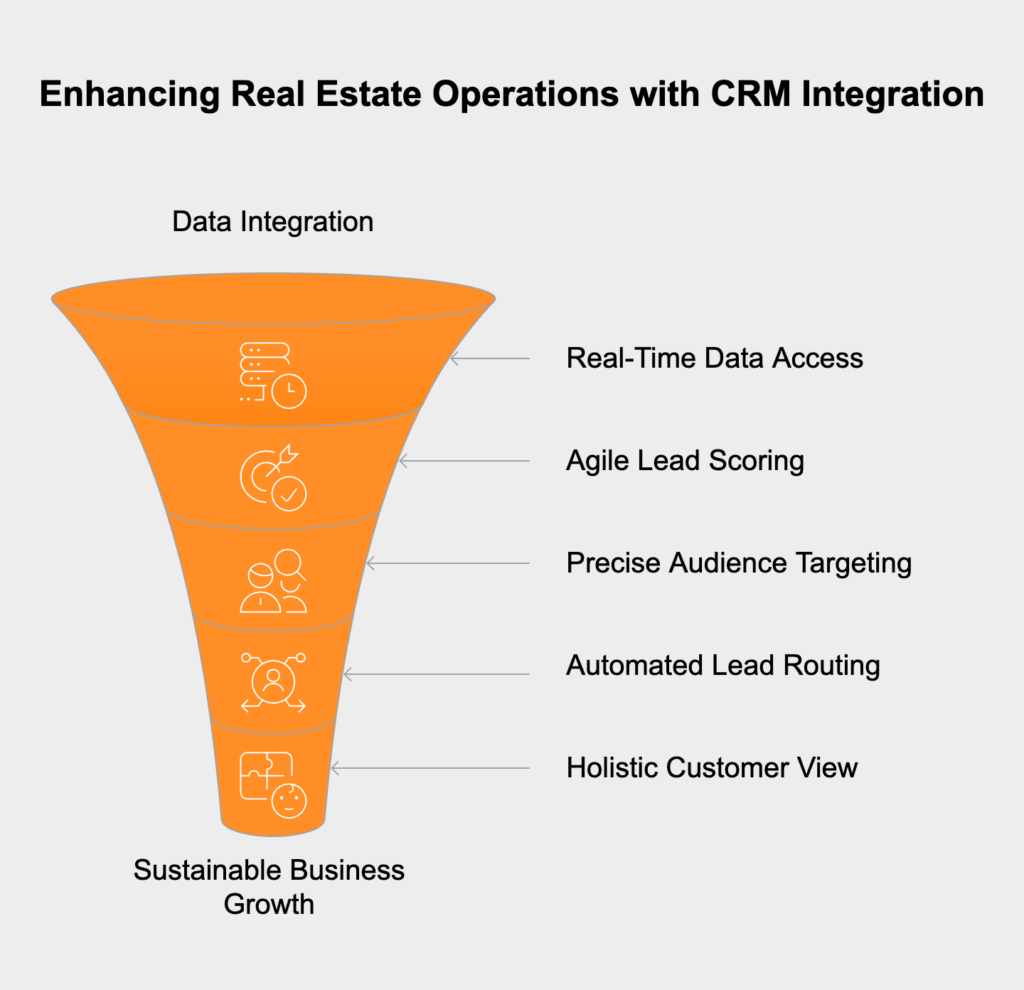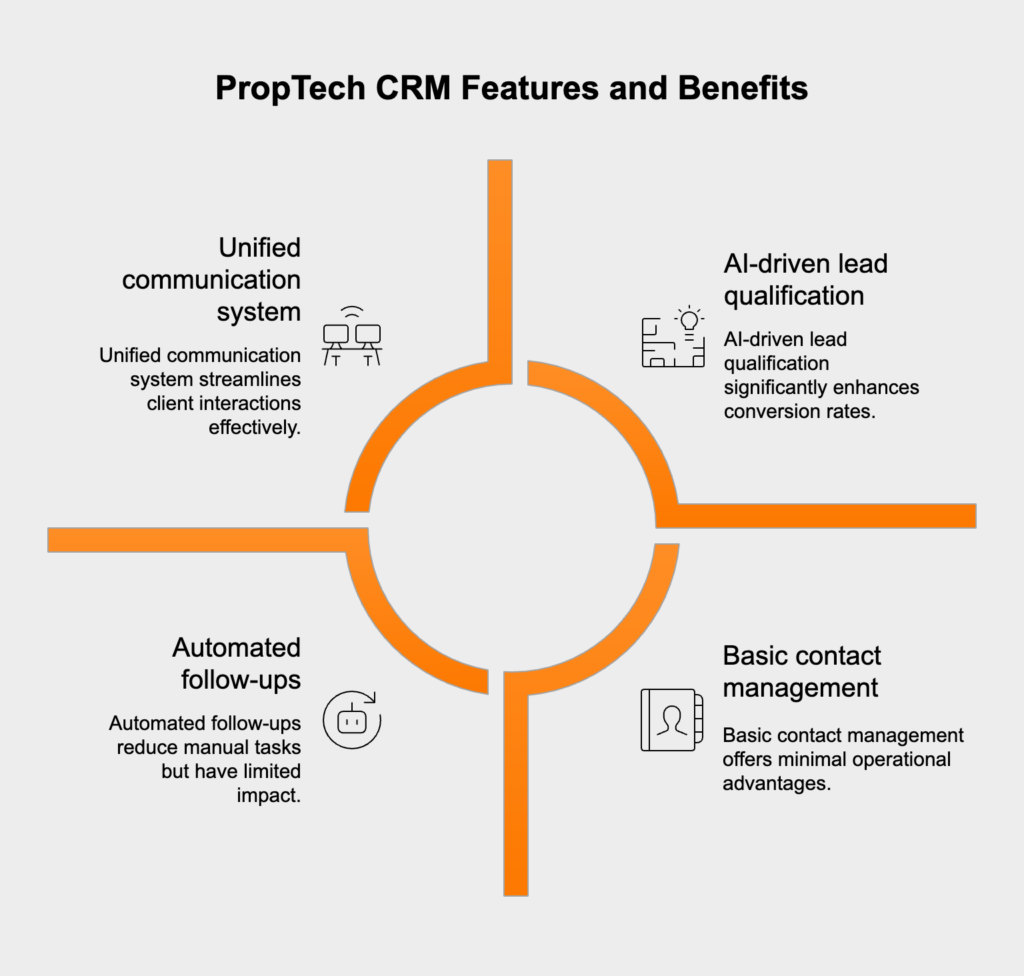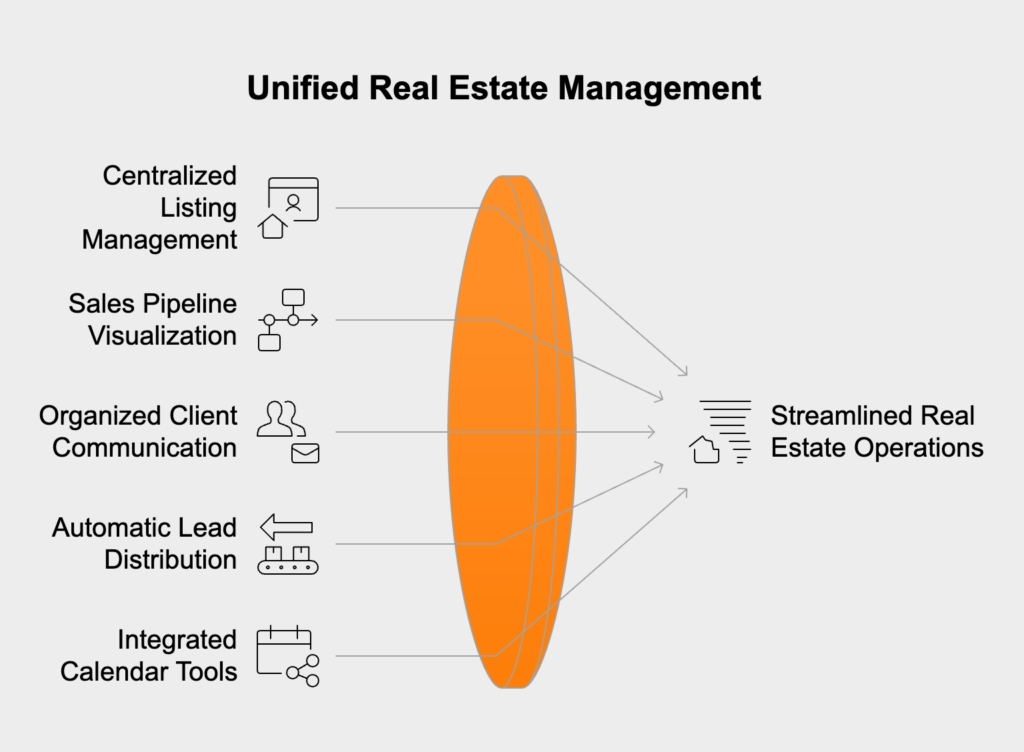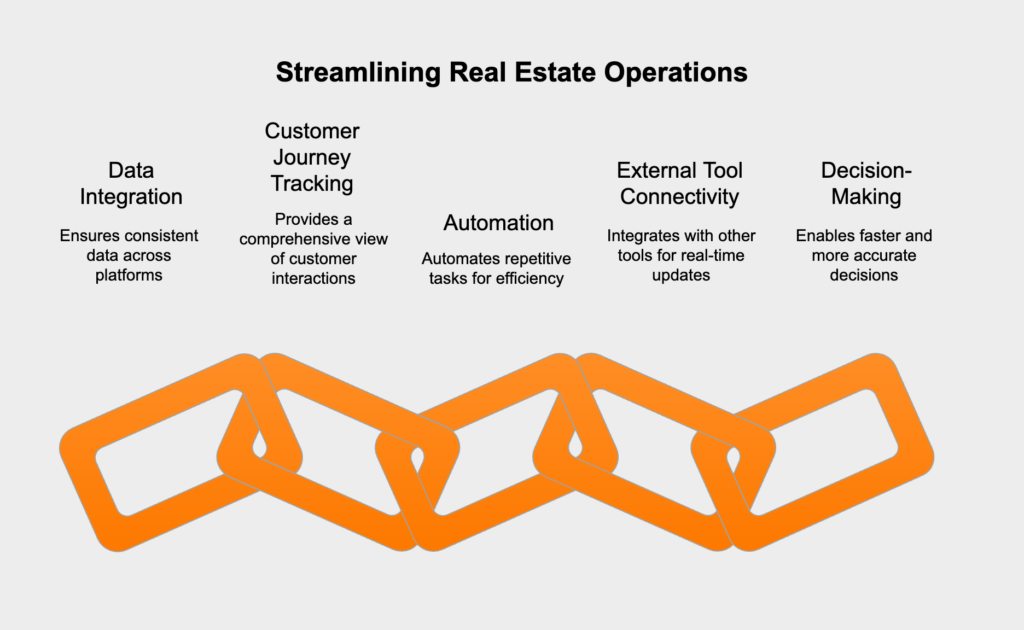10 Real Estate Software Development Companies in 2025
- February 03
- 9 min

Bringing PropTech platforms together with CRM systems consolidates sales and marketing data in one place, allowing teams to monitor lead interactions, property engagement, and campaign results in real time. This shared, unified data source eliminates information silos and ensures everyone is working with the most accurate and current lead tracking.
With marketing metrics like user engagement and behavior directly connected to real-time sales updates, such as deal status and closures, lead scoring becomes more agile and responsive. This integration also enables more precise audience targeting and enhances personalization in outreach efforts.
CRMs further streamline operations by connecting to tools like listing sites, online ads, and messaging platforms. New leads are automatically routed to the right agents, speeding up follow-up and improving response times. Quicker replies often lead to higher conversion rates. Meanwhile, the system’s data insights reveal which marketing channels, property listings, and messages generate the best results, guiding smarter marketing strategies.
When CRMs are linked with other PropTech solutions such as virtual tours, digital signature tools, and tenant engagement apps they offer a complete picture of the customer journey. This holistic view enhances engagement, makes automating routine processes more manageable, and supports sustainable growth. Most importantly, it equips teams with actionable insights to help scale the business with confidence.

PropTech CRMs are purpose-built for the real estate industry, offering features and workflows tailored to its unique demands. Unlike generic customer relationship management tools, these platforms come equipped with specialized capabilities such as property listing management and smart lead allocation routing inquiries based on agent availability or area of expertise. They also integrate effortlessly with regional real estate portals, streamlining online visibility.
While standard CRMs typically manage contact information, sales pipelines, and basic email campaigns, PropTech solutions go a step further. They consolidate customer communications, property listings, and engagement across websites, social media, and third-party portals into one centralized system. This unified approach ensures consistency and eliminates fragmented communication.
Many of these platforms also harness the power of AI to qualify leads. By evaluating user behavior how frequently a listing is viewed or if an inquiry is submitted they can highlight the most promising prospects. This allows agents to focus their time and energy on individuals most likely to convert, a level of insight that general CRMs rarely provide for the real estate sector.
Another standout feature is real-time data integration. PropTech CRMs link marketing performance directly to sales outcomes, giving teams valuable feedback to refine their campaigns. If, for instance, a certain listing gains traction on a specific portal, the system will flag this trend, enabling businesses to shift marketing budgets where they’ll have the greatest impact.
Automation plays a major role, too. These CRMs can automatically send follow-ups, schedule reminders, or trigger messages based on how clients interact with content. This minimizes manual tasks and ensures no lead falls through the cracks. Achieving this level of automation with a general CRM would typically require extensive customization.
Ultimately, by merging property listings, client communication, marketing insights, and sales data, PropTech CRMs empower teams to collaborate more effectively and respond faster. They help real estate professionals make informed decisions with connected, real-time insights replacing the scattered, siloed processes of the past.

Real estate CRMs streamline the way agencies operate by bringing listings, sales processes, and client communication together on one platform. This integration helps teams stay on top of their tasks while improving overall efficiency.
A key feature is the ability to manage property listings with ease. Agents can quickly update details like pricing, availability, location, and features, ensuring that all information shared on marketing platforms and property sites stays accurate and up to date.
Sales pipeline tools also play a major role by giving agents a clear view of where each lead stands from the initial inquiry all the way to closing. With this visibility, it’s easier to prioritize follow-ups, distribute workloads, and forecast future sales effectively, aligning with the typical steps of a real estate transaction.
When it comes to client communication, the CRM keeps track of all key interactions whether it’s a call, an email, or a meeting. Every message is tied to the relevant contact and property, creating a well-organized history that helps agents maintain consistent communication, transfer clients without confusion, and foster stronger relationships.
Many systems also offer smart lead routing, automatically assigning inquiries to the most appropriate agent based on factors like location or property type. Built-in calendar tools assist with organizing schedules, sending reminders, and planning appointments minimizing missed opportunities and cutting down on manual work.
By combining all these functions in one place, a real estate CRM promotes smoother collaboration among team members and more professional client service.
The result? Faster responses, better engagement, and a more streamlined approach to managing leads and deals.

Bringing a CRM system into a real estate business can make a big difference. It connects key functions from marketing and communication to finance and transactions into one streamlined platform. As a result, crucial information like customer activity, property details, and payment updates stays consistent across everything from ERP systems to messaging tools and e-signature platforms.
With instant data syncing, agents can respond more quickly and prioritize high-potential leads without wasting time on repetitive data entry. All communications, documents, and financial records are kept up-to-date and in one place, which speeds up the transaction process, enhances coordination, and reduces mistakes.
When a CRM is integrated using a reliable API network, a variety of daily tasks can be automated, such as:
Sales automation flows naturally, with leads advancing through predefined steps based on their behaviors and the stage of the deal, making the entire sales process smoother and more efficient.
For managing documents, an integrated CRM makes everything easier. Contracts, disclosures, and signed forms are all stored securely in one location, and each interaction with a client is tied back to a single database. This gives agents a complete view of each client’s journey, allowing them to offer more tailored and attentive service.
Ultimately, combining multiple tools into one cohesive system empowers real estate teams to make smarter choices. With better insights into performance and the ability to forecast revenue, they can adjust quickly as the market evolves.
In real estate, juggling separate tools for listings, leads, communication, and performance tracking can lead to a host of issues. Teams often find themselves repeating tasks, dealing with inconsistent data, and facing delays in decision-making. A centralized CRM streamlines everything by bringing all these functions under one roof.
A connected PropTech CRM integrates property listings, customer interactions, communication history, and marketing insights into a single platform. By using standardized data formats, it ensures that information remains clear and consistent throughout the system.
This kind of setup eliminates fragmented data stuck in separate systems. It captures every touchpoint from website visits and social media interactions to property portal inquiries and in-person meetings into one unified view. That way, teams can track the full customer journey. For example, a sales agent can quickly understand how a lead responded to previous marketing efforts, leading to more personalized and timely follow-ups.
Having everything in one place also transforms how teams handle leads and manage their daily tasks. With automation handling repetitive work, workflows become more efficient. The system can:
These CRMs also connect with external tools through APIs. Real-time integration with listing services, behavior tracking applications, or tenant management platforms ensures that data remains up-to-date across the board. This connectivity helps teams respond quickly, which is crucial in a fast-moving market.
When decisions are driven by a complete, unified data source, they’re not only faster but also more accurate. Managers can monitor performance across various channels, evaluate conversion rates, and forecast with confidence. Ultimately, a unified PropTech CRM empowers real estate teams to collaborate more effectively, boost productivity, and deliver a smoother, more personalized customer experience at scale.

Integrated PropTech CRM systems are designed specifically for the real estate industry, bringing all the essential tools into one streamlined platform. A key highlight is AI-driven lead scoring, which evaluates potential buyers or renters based on their interactions like the links they click, questions they ask, and how frequently they engage. This allows teams to focus their energy on leads with the highest potential to convert.
Automation is another major benefit. Tasks that typically require repetitive manual input such as sending follow-up reminders, triggering notifications, or moving prospects through the sales pipeline are managed automatically. This not only saves time but also keeps the sales process moving smoothly.
Communication is more efficient thanks to omni-channel integration. Whether a message comes through email, text, phone call, chat app, or social media, everything is stored in one place. This provides agents with a complete overview of each client’s journey and ensures consistent, informed interactions across all channels.
For agents in the field, mobile access is a game-changer. With just a phone or tablet, they can pull up property information, reach out to leads, or update the status of a deal. Being able to respond quickly often makes a big difference in closing rates.
Document management is made easier with a centralized storage system that keeps contracts, forms, and disclosures securely organized. Each document is linked to the appropriate deal or contact, simplifying audits and helping teams stay on top of compliance.
Built-in customer segmentation tools simplify the process of grouping leads based on specific criteria. These may include:
This enables more personalized messaging and targeted follow-ups, improving overall service.
Real-time analytics provide immediate insights into performance metrics. Teams can:
Interactive dashboards make the data easy to understand and act on.
The platform also integrates with other essential software, including:
This ensures that data stays synchronized and departments stay connected, enhancing collaboration across the board.
Altogether, these features create a powerful, cohesive system that streamlines operations, improves collaboration between sales and marketing, and offers a better experience for clients at every stage of the real estate process.
